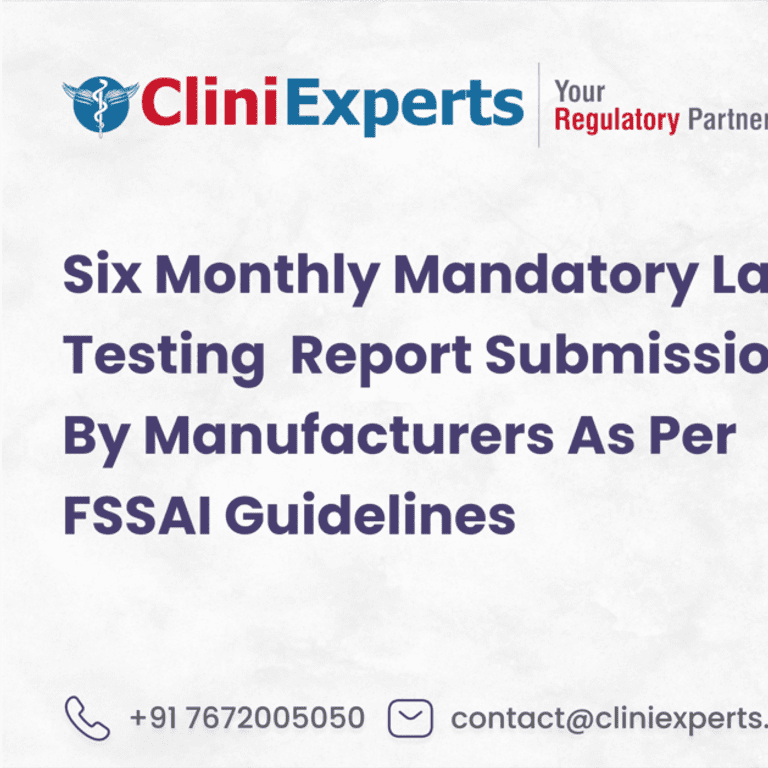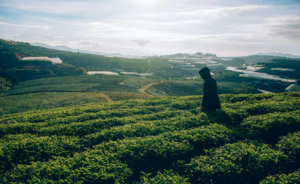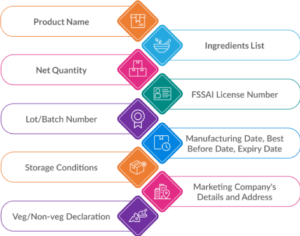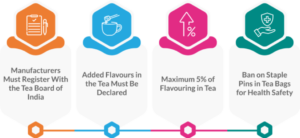Table of Content
Regulatory Requirements for Tea as Per the Food Safety and Standards Authority of India (FSSAI)

Summary
- The Food Safety and Standards Authority of India (FSSAI) defines tea standards and categories.
- Strict labelling requirements are followed to maintain transparency.
- Flavoured tea has a 5% maximum flavouring limit and requires the Tea Board registration.
- Staple pins in tea bags are banned for safety reasons.
- Comprehensive pesticide regulations are laid with updated Maximum Residue Limits (MRLs) and mandatory testing.
- Recent initiatives support small tea growers and address environmental concerns.
Short Description
This article outlines guidelines for tea as established by FSSAI by describing the standards, labelling, flavouring, pesticide use, and safety requirements. It also includes recent industry developments that support small tea growers and address ongoing environmental concerns.

Figure: Tea Plantation
Definition and Category of Tea
Tea is one of the most common beverages in India. It has been categorized under standard 2.10: BEVERAGES (other than dairy and fruits and vegetables based) by FSSAI. This classification includes specific criteria for the production, labelling, and marketing of tea to ensure consumer safety and product consistency.
Tea, as defined by FSSAI, refers to the processed form of the tender stem, leaves, and buds of the Camellia sinensis plant. It must be free from mould, dead insects, visible living insects, insect fragments, rodent contamination, added colouring, harmful substances, and extraneous matter. Tea can be classified into:
- Tea
- Kangra Tea
- Green Tea
- Instant Tea in Solid Form
Labelling Regulations and Advertisement Claims
Tea labelling in India is governed by the Food Safety and Standards (Labelling and Display) Regulations, 2020. Mandatory label information includes:
- Name of the Product
- List of Ingredients
- Net Quantity
- FSSAI License Number
- Lot/Batch Number
- Date Marking, Best Before and Expiry Dates
- Declaration regarding veg logo
- Storage conditions
- Name and complete address of the brand owner and more.
- Country Of Origin (Mandatory only for imported foods.)

Fig 1: Essential Labelling Requirements for a Processed Product
Tea is exempted from mandatory nutritional labelling. However, tea with added flavour must be labelled “FLAVOURED TEA.”
When making any claims about the properties or benefits of tea, manufacturers must comply with the Food Safety and Standards (Advertising and Claims) Regulation, 2018. Claims regarding the tea products must adhere to the Food Safety and Standards (Advertising and Claims) Regulation, 2018 and shall be truthful and not misleading. This includes any health or nutritional claims that are scientific and approved by FSSAI.
Tea Flavouring Regulations
Tea can contain “natural flavours” and “natural flavouring substances” as per FSSAI guidelines. However, there are specific regulations for flavoured tea:
- Manufacturers of flavoured tea must register with the Tea Board of India before marketing their products.
- Flavour preparations and single substances acceptable for human consumption must be derived exclusively through physical processes from plant materials, either in their natural state or after processing, and used only in packaged tea.
- Tea with added flavour must have a label declaration as required by Regulation 2.4.5 (23) of the Food Safety and Standards (Packaging and Labelling) Regulations, 2011.
- According to the Tea Board of India’s notification dated May 11, 2022, the addition of flavours to tea is limited to a maximum of 5%. Exceeding this limit will result in the Tea Board’s refusal to issue a flavoured tea registration certificate.
Packaging and Safety Measures
As a move towards consumer safety, FSSAI has banned the use of staple pins in tea bags. This directive, effective as of January 1, 2018, prohibits the manufacture, storage, distribution, sale, and import of stapled tea bags. This measure aims to prevent potential harm from accidental ingestion of staple pins.

Fig 2: Flavouring and Packaging Regulations
Pesticide Regulations
The regulation of pesticides in tea production is a critical aspect of ensuring consumer safety. The FSSAI has established Maximum Residue Limits (MRLs) for various pesticides used in tea cultivation, which are specified in the Food Safety and Standards Act (Contaminants, Toxins and Residues) Regulations, 2011. On April 27, 2023, FSSAI revised the MRLs for five pesticides used in tea production. Table 1 specifies the pesticides:
Table 1: Revised MRL for Five Pesticides Used in Tea
| Name of Pesticide | Maximum Residue Limit (mg/kg) |
|---|---|
| Fenpyroximate | 6.0 |
| Hexaconazole | 5.0 |
| Propiconazole | 6.0 |
| Quinalphos | 0.7 |
| Emamectin Benzoate | 0.06 |
A directive issued on November 29, 2023, mandates the testing of 20 banned pesticides in addition to those already specified in the regulations. The list includes:
- Aldicarb
- Aldrin, Dieldrin
- Chlordane
- Heptachlor
- Lindane
- Endosulfan
- Carbofuran
- Methomyl
- Phosphamidon
- Captafol
- Ferbam
- Formothion
- Simazine
- Diazinon
- Dichlorodiphenyltrichloroethane (DDT)
- Fenitrothion
- Fenthion
- Methyl Parathion
- Ethyl Parathion
- Monocrotophos
Further, on March 4, 2024, FSSAI added six more pesticides to the mandatory testing list. This includes cypermethrin, acephate, imidacloprid, acetamiprid, dinotefuran, and fipronil.
Recent Developments in the Tea Industry
The Tea Board of India has been actively working to maintain the quality of the tea produced in the country. In August 2024, officials conducted inspections of several tea gardens in the north of West Bengal to check quality standards. This proactive approach demonstrates the government’s commitment to upholding the reputation of Indian tea in global markets.
Support For Small Tea Growers
To support small tea growers in Northeast India, a new umbrella organisation called the Northeast Confederation Small Tea Growers Association (NECSTGA) was recently established in Golaghat on June 3, 2024. This organisation aims to expand and grow small tea owner businesses and tackle issues faced by the tea industry, which primarily include climate change and the use of banned chemicals.
The government has also introduced a Tea Development & Promotion Scheme (2023-24 to 2025-26) offering incentives for small tea growers by forming self-help groups and developing farmer-producer organisations to enhance productivity, quality, and value. It includes support for equipment, mini-factories, soil testing, and capacity building. These initiatives aim to support a significant segment of the tea industry, ensuring its long-term viability.
Unethical Practices
In July 2024, the tea estate owners’ association demanded a complete ban in marketing reprocessed tea waste as tea after gaining reports of this practice in the industry. The association insisted that tea waste be sold only as organic fertiliser because tea waste contains high caffeine levels, making it a potential health hazard.
Conclusion
The regulatory framework for tea in India is comprehensive and evolving. It encompasses strict guidelines, flavouring limits, labelling requirements, pesticide regulations, and safety measures. These regulations are designed to maintain high standards in tea production and safeguard consumer health while adapting to new challenges and developments in the industry.
Recent developments include supportive measures for small tea growers and raising awareness of ongoing issues in the industry. These regulations reflect the government’s commitment to maintaining India’s reputation in the global tea market while safeguarding consumer safety and product quality.
References:
- Chapter 2.10 (BEVERAGES, (Other than Dairy and Fruits & Vegetables based) Compendium on Food Safety and Standards (Food Products Standards and Food Additives) Regulation, 2011 (https://www.fssai.gov.in/upload/uploadfiles/files/Chapter%202_10%20(BEVERAGES%20(Other%20than%20Dairy%20and%20Fruits%20and%20Vegetables%20based).pdf)
- Food Safety and Standards (Labelling and Display) Regulations, 2020 (https://www.fssai.gov.in/upload/uploadfiles/files/Comp_Labelling.pdf)
- Food Safety and Standards (Advertising and Claims) Regulation, 2018 (https://www.fssai.gov.in/upload/uploadfiles/files/Compendium_Advertising_Claims_Regulations_14_12_2022.pdf)
- Tea Board of India (About Tea (teaboard.gov.in))
- https://www.teaboard.gov.in/pdf/Notice_percentage_of_flavour_pdf7110.pdf
- Food Safety and Standards (Contaminants, Toxins and Residues) Regulation, 2011 (https://www.fssai.gov.in/upload/uploadfiles/files/Compendium_Contaminants_Regulations_28_01_2022.pdf)
- https://www.fssai.gov.in/upload/advisories/2018/02/5a969125e4925249.pdf
- https://www.fssai.gov.in/upload/advisories/2023/04/644b6627e7923Direction_Fixation%20of%20MRL%20of%20Pesticides%20in%20Tea.pdf
- https://www.fssai.gov.in/upload/advisories/2023/12/656dbd1d58845Order%20for%20testing%20banned%20pesticides.pdf
- https://www.fssai.gov.in/upload/advisories/2024/03/65e6f53962cfbDirection_04.03.2024.pdf
- Tea Board officials inspect several gardens in Bengal to check quality
- Small tea growers of northeast India unite to address challenges https://hubnetwork.in/small-tea-growers-of-northeast-india-unite-to-address-challenges/
- https://kalimpongonlinenews.blogspot.com/2024/07/tea-industry-calls-for-ban-on-harmful.html?m=1
- Government offers incentives to small tea growers https://www.foodtechbiz.com/business-updates/government-offers-incentives-to-small-tea-growers
Enquire Now
To enquire about our services please complete the form below and we will be in tough with you as soon as possible
Food Regulatory Services
- Consumer Product
- Compliance Services
- Licenses